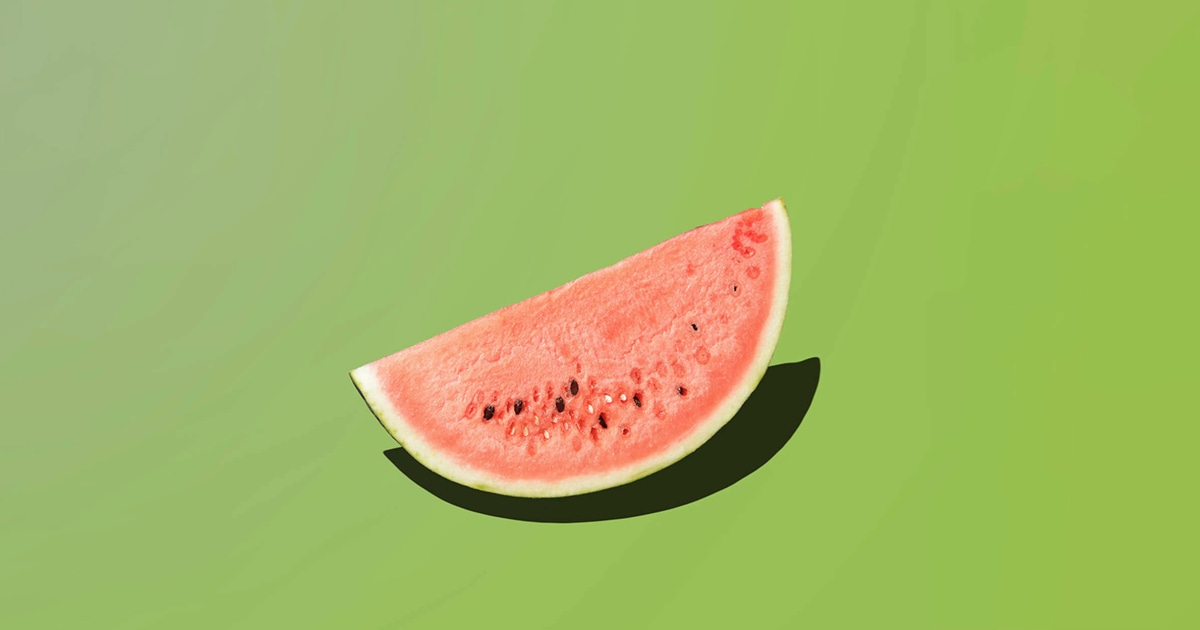Fruit has more than the power to hydrate on hot summer days. It can also deliver electrolytes — minerals that are critical for the body to function.
Electrolytes help nerves, muscles, the heart and the brain work properly. They balance the amount of water in the body, keep blood pressure stable and move nutrients into cells, according to the National Library of Medicine.
But people can sweat out these substances as temperatures rise.
“You lose electrolytes — sodium, potassium, calcium, magnesium — through sweat, respiration and urine. Respiration and urine output tend to stay the same, but perspiration can increase in hotter temperatures, specifically the summer,” says registered dietitian Natalie Rizzo, nutrition editor for TODAY.
“Fruit is a really good source of certain electrolytes, like potassium and magnesium.”
The main electrolyte lost in perspiration is sodium, which fruits contain in very small amounts or not at all. But eating fruit can still help replace some of the electrolytes lost in sweat, though if you’re sweating profusely, you probably need an electrolyte drink to help keep you hydrated, Rizzo notes.
Replenishing electrolytes is also a rare occasion where fruit juice may be a better choice than eating whole fruit.
“Fruit juice will probably have more electrolytes than a piece of fruit because several servings of fruit are used to make juice,” Rizzo says.
A fruit smoothie can also be turned into an electrolyte drink. The ingredients may include a banana for potassium, papaya for magnesium, orange juice for calcium and a pinch of salt, she advises.
Here are nine fruits highest in electrolytes:
Banana
- 1 medium banana, 451 milligrams of potassium, 32 milligrams of magnesium, 6 milligrams of calcium, 1 milligram of sodium
Tennis players often bite into a banana during breaks in the match and for good reason. Besides delivering energy, bananas are on the list of fruits highest in potassium, an electrolyte important for muscle contraction. A deficiency may cause leg cramps.
Bananas are starchy, but a medium piece of fruit still contains about 3 ounces of water — almost half a cup. They’re portable and satisfying, thanks to their natural sugar and fiber.
Watermelon
- 1 wedge of watermelon, 320 milligrams of potassium, 28 milligrams of magnesium, 3 milligrams of sodium, 20 milligrams of calcium
Sweet, supremely juicy and made up of 92% water, watermelon is the ultimate refresher during a heat wave and one of the healthiest summer fruits.
Rizzo calls it a “top-notch snack for athletes” because it’s so hydrating, provides carbohydrates for energy and replenishes potassium and other electrolytes lost in sweat.
Prunes
- 1/4 cup of prunes, 317 milligrams of potassium, 18 milligrams of magnesium, 18 milligrams of calcium, 0.85 grams of sodium
- 1/2 cup of prune juice, 353 milligrams of potassium, 18 milligrams of magnesium,15 grams of calcium, 5 milligrams of sodium
Famous for their gut health benefits, prunes and their juice can help replenish electrolytes thanks to their impressive potassium content. Prunes are also among fruits highest in magnesium.
Cherries
- 1 cup of sweet cherries, 306 milligrams of potassium, 15 milligrams of magnesium, 18 milligrams of calcium, 0 sodium
Packed with fiber, cherries are also a natural source of melatonin.
There’s evidence that eating cherries may improve sleep, cognitive function and recovery from pain after strenuous exercise, researchers note.
Cherries also make the list of fruits with the most iron and fruits with the most sugar for healthy energy.
Orange
- 1 orange, 255 milligrams potassium, 15 milligram magnesium, 65 milligrams calcium, 0 sodium
Oranges are famous for vitamin C, but they also make the list of fruits with the most calcium.
The citrus fruit is made up of mostly water, so it’s a hydrating snack to have before or after a workout, Rizzo points out.
Strawberries
- 1 cup of sliced strawberries, 254 milligrams of potassium, 21 milligrams of magnesium, 26 milligrams of calcium, 1.6 milligrams of sodium
Delicious, sweet and nutrient-dense, strawberries come with vitamins, minerals and antioxidants.
Just eight strawberries contain 100% of a person’s daily vitamin C needs.
They should be refrigerated, but take them out 15 minutes before eating so they can reach room temperature for peak flavor.
Mango
- 1 cup of raw mango, 277 milligrams of potassium, 15 milligrams of magnesium, 18 milligrams of calcium, 1.6 milligrams of sodium
Mango’s yellow flesh signals one of the fruits highest in vitamin A, an antioxidant that fights inflammation and plays an important role in eye health.
Mango is also juicy, aromatic and delicious on a hot summer day, whether eaten on its own or in a tropical fruit smoothie.
Avocado
- 1/3 of an avocado, 230 milligrams of potassium, 13 milligrams of magnesium, 6 milligrams of calcium, 3 milligrams of sodium
Avocado is a fruit famous for its healthy fat, but it also delivers vitamins E, C and K.
Create your own electrolyte drink with this Vanilla-Avocado Keto Smoothie recipe.
Pineapple
- 1 cup of raw pineapple, 206 milligrams of potassium, 20 milligrams of magnesium, 21 milligrams of calcium, 1.6 milligrams of sodium
High in vitamin C, pineapple also contains insoluble fiber, or roughage, which helps with regular bowel movements.
The fruit is as sweet as candy and its aroma has been ranked as one of the most pleasant smells, second only to vanilla.
Pineapple is perfect on its own or added to a fruit salad, smoothie or yogurt parfait.
